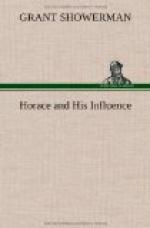Nor was even this the end of Horace’s experience with the world of action. It may be that his actual participation in affairs did cease with Maecenas’s gift of the Sabine farm, and it is true that he never pretended to live on their own ground the life of the high-born and rich, but he nevertheless associated on sympathetic terms with men through whom he felt all the activities and ideals of the class most representative of the national life, and past experiences and natural adaptability enabled him to assimilate their thoughts and emotions.
Thanks to the glowing personal nature of Horace’s works, we know who many of these friends and patrons were who so enlarged his vision and deepened his inspiration. Almost without exception his poems are addressed or dedicated to men with whom he was on terms of more than ordinary friendship. They were rare men,—fit audience, though few; men of experience in affairs at home and in the field, men of natural taste and real cultivation, of broad and sane outlook, of warm heart and deep sympathies. There was Virgil, whom he calls the half of his own being. There was Plotius, and there was Varius, bird of Maeonian song, whom he ranks with the singer of the Aeneid himself as the most luminously pure of souls on earth. There was Quintilius, whose death was bewailed by many good men;—when would incorruptible Faith and Truth find his equal? There was Maecenas, well-bred and worldly-wise, the pillar and ornament of his fortunes. There was Septimius, the hoped-for companion of his mellow old age in the little corner of earth that smiled on him beyond all others. There was Iccius, procurator of Agrippa’s estates in Sicily, sharing Horace’s delight in philosophy. There was Agrippa himself, son-in-law of Augustus, grave hero of battles and diplomacy. There was elderly Trebatius, sometime friend of Cicero and Caesar, with dry legal humor early seasoned in the wilds of Gaul. There were Pompeius and Corvinus, old-soldier friends with whom he exchanged reminiscences of the hard campaign. There was Messalla, a fellow-student at Athens, and Pollio, soldier, orator, and poet. There were Julius Florus and other members of the ambitious literary cohort in the train of Tiberius. There was Aristius Fuscus, the watch of whose wit was ever wound and ready to strike. There was Augustus himself, busy administrator of a world, who still found time for letters.
It is through the medium of personalities like these that Horace’s message was delivered to the world of his time and to later generations. How far the finished elegance of his expression is due to their discriminating taste, and how much of the breadth and sanity of his content is due to their vigor of character and cosmopolitan culture, we may only conjecture. Literature is not the product of a single individual. The responsive and stimulating audience is hardly less needful than the poet’s inspiration.
Such were the variety and abundance of Horace’s experience. It was large and human. He had touched life high and low, bond and free, public and private, military and civil, provincial and urban, Hellenic, Asiatic, and Italian, urban and rustic, ideal and practical, at the cultured court and among the ignorant, but not always unwise, common people.




